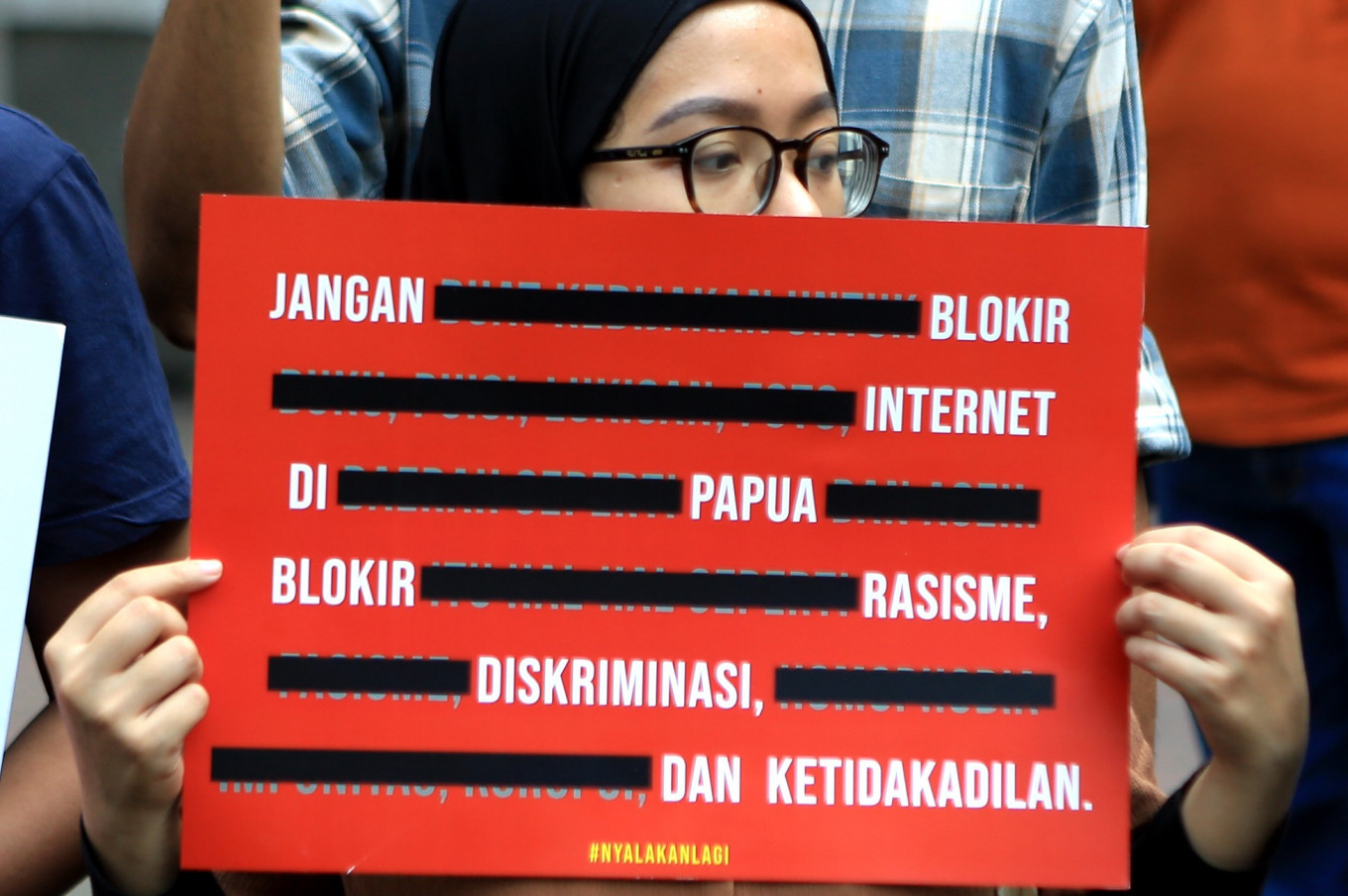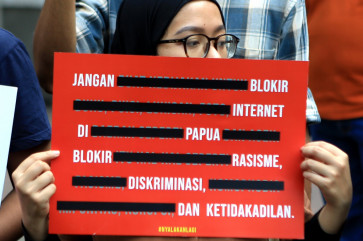Popular Reads
Top Results
Can't find what you're looking for?
View all search resultsPopular Reads
Top Results
Can't find what you're looking for?
View all search resultsReaffirming oligarchy in digital realm
Public safety must be prioritized. However, what worries human rights activists is the unclear definition of emergency and public interest, which could further justify the state’s control of information to maintain power.
Change text size
Gift Premium Articles
to Anyone
 Solidarity: An activist holds up a poster during a demonstration in Jakarta on Friday, August 23, in protest of the internet blackout in Papua and West Papua, imposed following riots in a number of the provinces’ cities. The violence was a reaction to physical and racial abuse of Papuan students in Surabaya, East Java. (JP/Seto Wardhana)
Solidarity: An activist holds up a poster during a demonstration in Jakarta on Friday, August 23, in protest of the internet blackout in Papua and West Papua, imposed following riots in a number of the provinces’ cities. The violence was a reaction to physical and racial abuse of Papuan students in Surabaya, East Java. (JP/Seto Wardhana)
T
he new communications and information minister, Johnny G. Plate, has said that the government may restrict social media access in states of emergency and has cautioned netizens against circulating sensitive content. While acknowledging that this may violate freedom of speech, he said the government had no choice to limit the impact of materials that could harm the public.
Public safety must be prioritized. However, what worries human rights activists is the unclear definition of emergency and public interest, which could further justify the state’s control of information to maintain power. As in the old days, criticism of state policies and officials may be considered sensitive. Instead of responding to this criticism with introspection and improvement, the government may simply restrict internet access.
The government has already limited access to digital spaces at least twice this year. The first was a social media restriction during protests against the results of the presidential election in May. The second was an internet restriction in Papua following protests against racism in August and riots in several cities in Papua and elsewhere. Instead of reducing hoaxes, as the claimed intention, both restrictions actually led to confusion and suspicion of the government.
This tendency to limit freedom shows the true nature of government, currently upheld by old political figures and business oligarchs, which tend to be authoritarian and seek control the digital sphere. As some mainstream media owners have become government supporters, social media increasingly provides a channel to voice dissatisfaction with the government — regardless of whether users believe the widespread hoaxes.
Control of the digital realm is essential for oligarchs supporting the government who seek a head start in the 2024 presidential election, when President Joko “Jokowi” Widodo will no longer be able to run.
In 2014, Jokowi’s popularity, or the “Jokowi effect”, as governor of Jakarta propelled him to become the strongest presidential candidate. Media researcher Ross Tapsell, in his book Media Power in Indonesia: Oligarchs, Citizens and the Digital Revolution, says Jokowi’s popularity foiled the plans of the political and business oligarchs who, under then-president Susilo Bambang Yudhoyono, had consolidated power. Instead of nominating old faces that would bore the public, some titans had no choice but to support the then-outsider Jokowi.
A number of mainstream media outlets whose owners supported Prabowo Subianto in the 2014 presidential election allegedly reduced their coverage of Jokowi to dampen his popularity. However, trending topics relating to Jokowi and his appearance on social media made him unstoppable. In the digital sphere, anyone can create content and form their own audience. Therefore, for the first time in the history of Indonesian elections, social media became an important weapon to win elections. Jokowi and his volunteer supporters, who from the beginning realized the importance of social media, managed to win the fight — although by a rather slim margin.

















